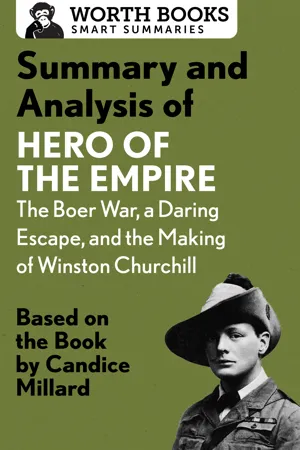Summary
Prologue
Standing outside the prison fence he’s just climbed over, Winston Churchill waits for his comrades-in-arms to join him. Though young, he’s already a veteran of four wars, and his goal of achieving military glory stands firm. When his friends make clear they can’t get out of the prison, however, Churchill faces a situation he never expected: He’s in an enemy land where he doesn’t speak the language, alone, and is carrying no provisions. He doesn’t even know which direction to run. None of this is to big a problem for Churchill. His extraordinary faith in himself is sure to see him through.
Winston Churchill was fascinated by war from his earliest days. He had an army of 1,500 toy soldiers, and enthusiastically fought and planned imaginary campaigns, hoping one day for the real thing, complete with a reputation for courage and daring. He attended Sandhurst, the Royal Military College, graduating in 1894, in a world where the British Empire covered a fifth of the globe and there was always combat in some part of it. Glory was to be won through medals, but modesty was considered a virtue. Churchill had no desire for the virtue, but he did want the medals. Through a combination of self-promotion and family connections, he saw his first action as a military observer in Cuba. His real education started the next year, on the North-West Frontier Province of India, fighting the ferocious Pashtun tribesmen. The fighting moved to the Hindu Kush mountains the next year, and Winston went with it. There was no room in the expedition for a regular officer, so he went as a combination officer and news correspondent. The unit he was with was attacked and surrounded, but Churchill stood his ground, shooting Pashtuns with a revolver until the relief column arrived. Many were killed, but Churchill was unscathed, and wasn’t at all surprised, as he believed God had greater things for him in mind.
Chapter 2: The Graven Palm
The year 1898 was a big year for Churchill. He once again got himself to the forefront of colonial warfare, this time in the Sudan, ending up at the climactic Battle of Omdurman. He shot more than six men in this campaign, but more importantly, wrote a widely renowned book about it, The River War. He began to garner a reputation, and thought about following his father’s footsteps into politics. His father, Lord Randolph Churchill, was the third son of the seventh Duke of Marlborough. The family was spectacularly well connected, but didn’t have much money left. Randolph married an American heiress named Jennie Jerome, who was herself impressive in the realms of looks and charisma, but unfortunately didn’t have as much money as it might have appeared. Randolph had a degree of brilliance, though, and skyrocketed to Chancellor of the Exchequer at the tender age of 37. He then sabotaged himself, and died at the equally tender age of 45. Winston wasn’t close to his father, but he idolized him and wanted to mirror his achievements, if not his mistakes. In debt and wanting to move ahead, Winston resigned his military commission and accepted an offer to run for Parliament.
Chapter 3: The Scion
Churchill gave his first political speech—in his campaign for Parliament—in 1899. It was well received, and he loved doing it. Surprisingly, he was not a natural. He had a speech impediment, which he worked long hours to correct, the result of which was his distinctive way of speaking. He also wrote and practiced every element of his speeches carefully, though he delivered them in a calculated manner to feel off the cuff. In spite of his good press and the help of his beautiful, charismatic (and frequently scandalized) mother Jennie, Churchill lost the election to the Liberals. Having resigned from the army, Churchill had no profession to fall back on, but he still had great writing talent and great ambition.
Chapter 4: Blowing the Trumpet
Churchill grew up largely at Blenheim Palace, the magnificent estate granted to John Churchill, first Duke of Marlborough, for his victory at Blenheim in 1704. The estate belonged to Winston’s cousin, the current Duke, but Winston was very conscious of the Churchill legacy, of his cousin’s place in Parliament, and of his own father’s early parliamentary start. He felt he was losing time. He was also conscious of growing trouble between the British and the Boers, the Dutch settlers in South Africa. The Dutch had been in South Africa for nearly 300 years, while the British didn’t establish Cape Colony and other coastal enclaves until 1806. At first, the British and the Dutch left each other alone. But the British began moving inland, and, in 1833, they abolished slavery in the Cape. Dutch pioneers left and established the Orange Free State, Natal, and the Transvaal in the interior. The British annexed Natal in 1843; diamond mines were discovered in the Transvaal, and the British annexed that too. This prompted the First Boer War in 1880, which ended, to everyone’s surprise, with a British defeat at Majuba Hill. The British were entirely unwilling to let this result stand, setting the stage for further conflict. Churchill, like most Britons, believed in the might and right of the British Empire, and spoke in favor of war with t...
